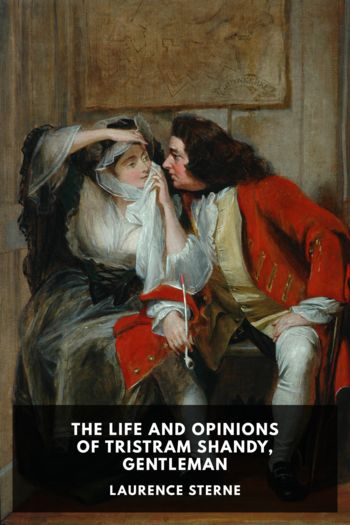The Life and Opinions of Tristram Shandy, Gentleman, Laurence Sterne [rosie project txt] 📗

- Author: Laurence Sterne
Book online «The Life and Opinions of Tristram Shandy, Gentleman, Laurence Sterne [rosie project txt] 📗». Author Laurence Sterne
If the reader has the curiosity to see the question upon baptism by injection, as presented to the Doctors of the Sorbonne, with their consultation thereupon, it is as follows.
↩
Vide Deventer, Paris edit., 4to, 1734, p. 366. ↩
Pentagraph, an instrument to copy Prints and Pictures mechanically, and in any proportion. ↩
The author is here twice mistaken; for Lithopædus should be wrote thus, Lithopædii Senonensis Icon. The second mistake is, that this Lithopædus is not an author, but a drawing of a petrified child. The account of this, published by Athosius 1580, may be seen at the end of Cordæus’s works in Spachius. Mr. Tristram Shandy has been led into this error, either from seeing Lithopædus’s name of late in a catalogue of learned writers in Dr. ⸻, or by mistaking Lithopædus for Trinecavellius,⸺from the too great similitude of the names. ↩
Vide book 2, chapter 18. ↩
As the genuineness of the consultation of the Sorbonne upon the question of baptism, was doubted by some, and denied by others⸺’twas thought proper to print the original of this excommunication; for the copy of which Mr. Shandy returns thanks to the chapter clerk of the dean and chapter of Rochester. ↩
Vide Locke. ↩
As Hafen Slawkenbergius de Nasis is extremely scarce, it may not be unacceptable to the learned reader to see the specimen of a few pages of his original; I will make no reflection upon it, but that his story-telling Latin is much more concise than his philosophic—and, I think, has more of Latinity in it. ↩
Hafen Slawkenbergius means the Benedictine nuns of Cluny, founded in the year 940, by Odo, abbé de Cluny. ↩
Mr. Shandy’s compliments to orators⸺is very sensible that Slawkenbergius has here changed his metaphor⸻which he is very guilty of:⸺that as a translator, Mr. Shandy has all along done what he could to make him stick to it—but that here ’twas impossible. ↩
Nonnulli ex nostratibus eadem loquendi formulâ utun. Quinimo & Logistæ & Canonistæ⸺Vid. Parce Barne Jas in d. L. Provincial. Constitut. de conjec. vid. Vol. Lib. 4. Titul. 1. n. 7 quâ etiam in re conspir. Om de Promontorio Nas. Tichmak. ff. d. tit. 3. fol. 189. passim. Vid. Glos. de contrahend. empt, etc. necnon J. Scrudr, in cap. § refut. per totum. Cum his cons. Rever. J. Tubal, Sentent. & Prov. cap. 9. ff. 11, 12. obiter. V & Librum, cui Tit. de Terris & Phras. Belg. ad finem, cum comment, N. Bardy Belg. Vid. Scrip. Argentotarens. de Antiq. Ecc. in Episc. Archiv. fid coll. per Von Jacobum Koinshoven Folio Argent. 1583. præcip. ad finem. Quibus add. Rebuff in L. obvenire de Signif. Nom. ff. fol. & de jure Gent. & Civil. de protib. aliena feud. per federa, test. Joha. Luxius in prolegom, quem velim videas, de Analy. Cap. 1, 2, 3. Vid. Idea. ↩
Hæc mira, satisque horrenda. Planetarum coitio sub Scorpio Asterismo in nona cœli statione, quam Arabes religioni deputabant efficit Martinum Lutherum sacrilegum hereticum, Christianæ religionis hostem acerrimum atque prophanum, ex horoscopi directione ad Martis coitum, religiosissimus obiit, ejus Anima scelestissima ad infernos navigavit—ab Alecto, Tisiphone & Megara flagellis igneis cruciata perenniter.
⸺Lucas Gaurieus in Tractatu astrologico de præteritis multorum hominum accidentibus per genituras examinatis↩
Ce Fœtus n’étoit pas plus grand que la paume de la main; mais son père l’ayant éxaminé en qualité de Médecin, & ayant trouvé que c’etoit quâlque chose de plus qu’un Embryon, le fit transporter tout vivant à Rapallo, ou il le fit voir à Jerôme Bardi & à d’autres Médecins du lieu. On trouva qu’il ne lui manquoit rien d’essentiel à la vie; & son père pour faire voir un essai de son experience, entreprit d’achever l’ouvrage de la Nature, & de travailler à la formation de l’Enfant avec le même artifice que celui dont on se sert pour faire écclorre les Poulets en Egypte. Il instruisit une Nourisse de tout ce qu’elle avoit à faire, & ayant fait mettre son fils dans un pour proprement accommodé, il reussit à l’élever & à lui faire prendre ses accroissemens necessaires, par l’uniformité d’une chaleur étrangere mesurée éxactement sur les dégrés d’un Thermométre, ou d’un autre instrument équivalent. (Vide Mich. Giustinian, ne gli Scritt. Liguri à Cart. 223. 488.)
On auroit toujours été très satisfait de l’industrie d’un père si experimenté dans l’Art de la Generation, quand il n’auroit pû prolonger la vie à son fils que pour quelques mois, ou pour peu d’années.
Mais quand on se represente que l’Enfant a vecu près de quatre-vingts ans, & qu’il a composé quatre-vingts Ouvrages differents tous fruits d’une longue lecture—il faut convenir que tout ce qui est incroyable n’est pas toujours faux, & que la Vraisemblance n’est pas toujours du côté de la Verité.
Il n’avoit que dix neuf ans lorsqu’il composa Gonopsychanthropologia de Origine Animæ humanæ.
(Les Enfans celebres, revûs & corrigés par M. de la Monnoye de l’Academie Françoise.) ↩
Vide Menagiana, Vol. I. ↩
Vide Swinburn on Testaments, Part 7, §8. ↩
Vide Brook, Abridg. Tit. Administr. N. 47. ↩
Mater non numeratur inter consanguineos, Bald. in ult. C. de Verb. signific. ↩
Vide Brook, Abridg. Tit. Administr. N. 47. ↩
Volumes V and VI in the first Edition. ↩
This book my father would never consent to publish; ’tis in manuscript, with some other tracts of his, in the family, all, or most of which will be printed in due time. ↩
Mr. Shandy is supposed to mean ******** *** Esq.; member for ******,⸺and not the





Comments (0)